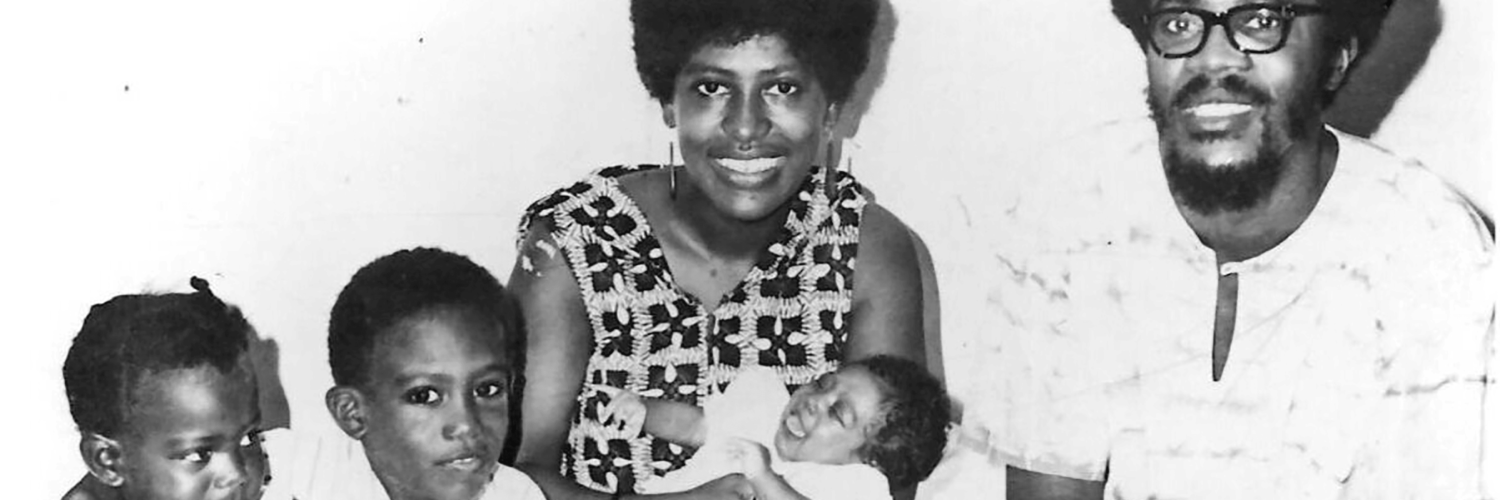PORTRAIT: A new film on the life of Walter Rodney gives a glimpse of his radical solidarity politics and centres on his family, who struggled and suffered with him…

By William Shoki
In the pantheon of radical black figures snatched from us too soon (which includes the likes of Lumumba and Cabral), Walter Rodney looms large. The Guyanese historian and activist lived a short life—he was assassinated at only 38 years old—but he lived it passionately. His intellectual output was sizable, and his political activities immense, stretched across the Caribbean, Africa, Europe, and North America.
To consider what Rodney’s life might have become were he still alive is an understandable daydream. That his legacy endures so resiliently, is a testament to the fact that here was a man who was just getting started.
A new documentary exploring Rodney’s life only adds to the wondering about the possible trajectories his life could’ve taken. Directed by the father and son duo of Arlen Harris and Daniyal Harris-Vadja, Walter Rodney: What They Don’t Want You to Know is a thrilling portrait of a man who seamlessly embodied revolutionary intellect with revolutionary action. (Africa Is a Country, in partnership with the Radical Books Collective, did public screenings of the film this week in Johannesburg and New York City.)
Shot in Guyana, Jamaica, the United Kingdom, Tanzania, Barbados, and the United States, the film follows Rodney’s life between Guyana, Jamaica, England, and Tanzania, back to Jamaica, Tanzania again, and then, finally, to Guyana, where he was violently murdered.
It also centers his widow, Patricia, and his siblings, particularly one of his brothers, Donald, who suffered personally and professionally for his loyalty to Rodney. The transitions between locales, punctuated by different interlocutors, can sometimes be dizzying, but the effect, if anything, is to offer a glimpse into the breadth of Rodney’s productive footprint, and the depth of his personal impact.
What is most impressive about Rodney is the extent to which he submerged himself in political struggle—something that pierces through writings like The Groundings With My Brothers, but is sharpened through the visual form. Rodney spent the final years of his life at home, in Guyana, devoted to the Working People’s Alliance, a political party that drew its base from the ranks of both the Afro and Indo-Guyanese working class.
In the final moments of the film, we hear the theory of change from Rodney himself: “One of the principal tasks of our generation, perhaps the most overriding task: to break the division in the ranks of the working class, to overcome that division. To create a unity based on struggle.”
In a street speech given in Guyana, Rodney once declared that “No ordinary Afro-Guyanese, no ordinary Indo-Guyanese can today afford to be misled by the myth of race.” Rodney often gets rewritten as someone in the same orbit as the black nationalists that would have been ascendant during this time.
But while Rodney never denied the reality of racism, he was clear on race: “The system doesn’t stop at racial discrimination. Because it is a system of class oppression, it only camouflages its class nature under a racial cover.
And in the end, it will move against anyone irrespective of color.” This is why Guyana’s CIA-backed, black nationalist president, Forbes Burnham, had Rodney killed in 1980.
If we want to stand any chance at resisting our period’s great ills, such as rampant inequality, ecological devastation, and an escalating cost of living (which is generating social anxiety and compounding the retreat into identity-based identification and essentialism), we need to re-popularize frameworks that accurately name which groups are responsible for structuring society the way it is now.
We need to make class the main fault line of social polarization. To do this presents the greatest threat to the capitalist system’s stability because it unmasks what is otherwise obscured: the system is of our own making, and we have the agency to undo it. This is what they don’t want you to know.
*William Shoki is the deputy editor of Africa Is a Country. He is based in Johannesburg. This article was sourced from Africa Is a Country, a media outlet of opinion, analysis, and new writing on and from the African left, and which was founded in 2009
ABOUT WALTER RODNEY
Walter Anthony Rodney was born to Edward and Pauline Rodney in Georgetown, Guyana on March 23, 1942. He was the second child of five siblings, including four brothers, and one sister.
Rodney grew up during the country’s anti-colonial movement; his father was a member of the Marxist-oriented People’s Progressive Party, which led the struggle for freedom from British rule. With this immersion into politics, Walter’s interest in the struggles of the working class began at a young age and continued with his involvement in debate and study groups throughout his student years. He developed into an intellectual and scholar and is recognized as one of the Caribbean’s most brilliant minds.
Rodney’s academic record is filled with awards, open scholarships, and honors. He attended Queen’s College, the premiere boy’s high school in Guyana, and in 1960 graduated first in his class, winning an open scholarship to the University of the West Indies (UWI). He pursued his undergraduate studies at UWI Mona Campus in Jamaica, where he graduated with First Class honors BA in History in 1963. Rodney then attended the prestigious School of Oriental and African Studies (SOAS), London University. He graduated with his PhD with Honors in African History at 24 years old on the same day he welcomed his firstborn son, Shaka. Rodney’s thesis, A History of the Upper Guinea Coast, was published by Oxford University Press in 1970. – Source: The Walter Rodney Foundation































